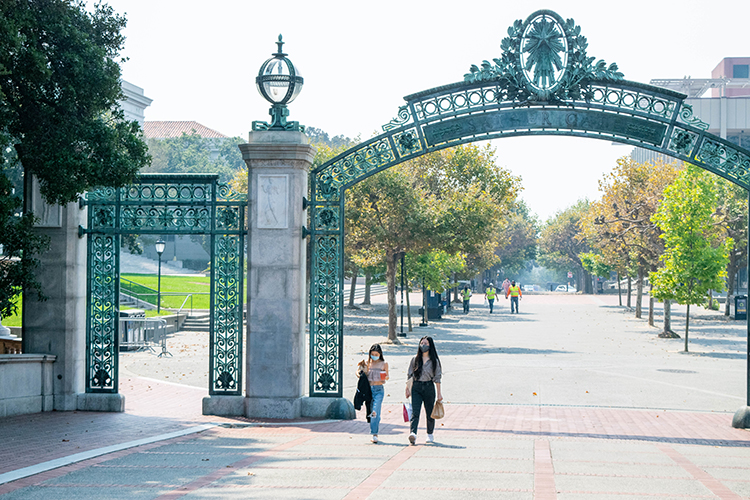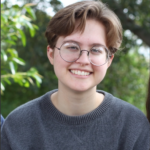For many of us at UC Berkeley, remote work has been a hallmark of the pandemic. As a community we’ve thought a lot about what it’s been like for students to learn remotely and for staff and faculty to work remotely. But with thousands of undergraduate student employees across campus (500 at the UC Library alone), what was it like for undergraduate student employees — those who could — to work remotely during shelter-in-place?
As a staff member, my quality of life improved significantly when I was able to work from home every day. I was fortunate in that my work at the Oral History Center could seamlessly be done entirely online. I gained more time for sleep, exercise, even a leisurely cup of coffee in the morning. Remote work made my job as a manager of up to seven student employees easier. Prior to shelter-in-place, my students’ schedules revolved around their classes and there was never an overlap of all my assistants. I would have to train them separately, answer questions that could benefit all one by one. With the flexibility they gained through at-home learning, asynchronous classes, and no commute time, my students could easily hop on an online meeting outside of their core work hours. And they were willing, even eager, to adjust their schedules so we could all meet together. I was able to schedule regular team meetings for trainings and the exchange of ideas, leading to higher work quality. I was able to extend trust and tools for the student workers to be successful remotely, and I was impressed with how much they were able to accomplish. From my perspective, we were also able to build more of a community and I looked forward to our team meetings as a highlight of my work day. I still wondered, though, what was it like for my student employees to work remotely? So I asked them.

Our team’s student editors serve critical functions in our oral history production, analyzing entire transcripts to write discursive tables of contents, entering interviewee comments, editing front matter, writing abstracts, and more. They do the work of professional editors and we would not be able to keep up our pace of interviews without them. Here, three of the Oral History Center’s editorial assistants describe their experience of remote work during the pandemic.
Ashley Sangyou Kim

Ashley Sangyou Kim is currently a fourth-year student at UC Berkeley studying rhetoric. She is an editor for the World Section of Berkeley Political Review (BPR).
[Written after return to campus]
I am extremely privileged to be able to say that the pandemic was more of a blessing than a curse for me. My family got closer, I learned how to take better care of myself both mentally and physically, and school was more exciting when I returned to campus. All of these changes stemmed from the fact that I had more time. I had more room throughout my day to think about what I was doing and, more importantly, what I wanted. The shock of the pandemic shook me out of auto-pilot mode and forced me to reflect in a peaceful silence.
One of the things that guided me during my reflections was reading interviews from the Oral History Center. As an editorial assistant, I get to write abstracts and tables of contents for interviews. Working at home helped me to relax and read more deeply into each transcript. Many of these conversations cover one person’s life from early childhood to retirement, with explanations on what led to significant decisions. These were incredible stories: Willie Brown’s journey from janitor to mayor of San Francisco, Dorothea Lange finding her sensitivity as an artist, and Josephine Miles pursuing higher education despite her disabilities to become the first woman tenured in our English Department. I paid special attention to how the interviewees discovered their passions and special skills. How do people know what they can contribute to the world? Which voice in your head do you listen to? These questions filled my brain over quarantine, and the OHC’s interviews offered a multitude of ways in which other people answered them.
Now almost three months out of quarantine, I still find myself referring back to the interviews I read over the pandemic. When I registered for classes, for example, I recalled Felix Khunar’s interview, and how he regretted not taking classes outside of music before his college education was cut short. He had to flee Nazi Germany. Little life lessons like this still pop up in my post-pandemic life, and I am grateful that my job allowed me to walk in so many people’s shoes so that I can see my life from multiple perspectives.
Jordan Harris
Jordan Harris worked at the Oral History Center as an editorial assistant from February 2020 to August 2021. She graduated from UC Berkeley in May with a bachelor’s degree in English.
[Written prior to return to campus]
I was hired as an editorial assistant shortly before the COVID-19 pandemic prompted the closure of The Bancroft Library, forcing employees to begin working remotely. I remember my last day working in the Oral History Center: it was my second shift, and everything was quieter than usual because I happened to be the only one in the part of the office where I was working. Sitting in one of the cubicles, I remember looking out the window on my right and seeing a group of protesters walking by with their homemade signs. I don’t remember what they were protesting (or advocating), but I do remember feeling a peculiar peace of sorts. It was a perfect moment of normalcy — at least by Berkeley standards — that now feels like a memory tainted by melancholy.
It really is unnerving to think about how that peace was shattered so quickly, my next shift spent in my Northside home of twenty-six students — a number that seemed alarming at the time. But over the next several months, it became clear that this was work we could successfully do remotely, even if it meant a lot of slowing down and emails and Zoom meetings. Amid the uncertainty of everything else happening at the time, working for the OHC was ultimately one of the few points of stability in my life throughout the rest of that semester and the following year, and it’s an experience I’ll always be grateful for.
Shannon White

Shannon White is currently a third-year student at UC Berkeley studying classical languages. They are an undergraduate research apprentice in the Nemea Center under Professor Kim Shelton and a member of the editing staff for the Berkeley Undergraduate Journal of Classics.
[Written prior to return to campus]
I applied for this job at the last minute—a combination of my planned archaeology field school in Greece being cancelled and my sudden need to find housing and something to occupy my summer. I’m one of the newest hires on my team; all of my training happened remotely over Zoom and I’ve never worked in our office space. For the most part, remote work has been great. I enjoy working from home—I’ve got my office space set up in a way that works for me and I live in a house with other people who are also working or taking classes and understand the difficulties of handling everything remotely. At the same time though, it’s been rough. Establishing a stable work-life balance is difficult when you work and live in the same place. Overall, however, I think the transition to fully remote work during COVID-19 has been relatively smooth. Though it’s been strange working at a job where I’ve never met any of my co-workers in person, I’m glad I applied when I did and I can honestly say the ability to control when and where I work has been great for me.
About the Oral History Center
The Oral History Center of The Bancroft Library has interviews on just about every topic imaginable. You can find the interviews mentioned here and all our oral histories from the search feature on our home page. Search by name, keyword, and several other criteria.
The Oral History Center preserves voices of people from all walks of life, with varying political perspectives, national origins, and ethnic backgrounds. We are committed to open access and our oral histories and interpretive materials are available online at no cost to scholars and the public.